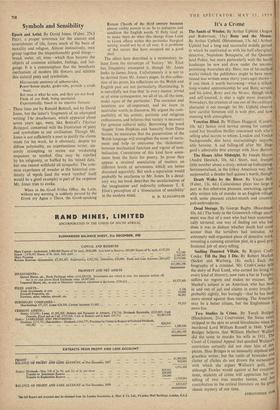Symbols and Sensibility
Epoch and Artist. By David Jones. (Faber, 25s.) PIETY, a proper reverence for the sources and nourishment of life, forms much of the basis of morality and religion. Almost instinctively, men group together the unquestionably good things— bread, water, oil, wine—which thus become the objects of common attitudes, feelings, and lan- guage. It is a commonplace that the beneficent mechanism of modern life thwarts and inhibits this natural piety and symbolism.
Microscopic anatomy of ephemerides,
Power-house stacks, girder-ribs, provide a crude base; But man is what he eats, and they are not bred Flesh of our flesh, being unrelated Experientially, fused in no emotive furnace.
These lines are by Ronald Bottrall, not by David Jones, but the latter's 'fragments of an attempted writing' The Anathemata, which appeared about seven years ago, were, like Bottrall's Thyrsus Retipped, concerned with the frustration of piety and symbolism in our civilisation. Though Mr. Jones is not sufficiently a poet to justify the claims made for his work, he is obviously, despite his diffuse polymathy, an unpretentious writer, sin- cerely attempting to revive our weakening responses to symbol. One may be repelled by his religiosity, or baffled by his 'mixed data,' but one cannot withhold all sympathy. The com- mon experience of wonder at the historical con- tinuity of words (and the word 'symbol' itself would be a gbod example) is part of the response Mr. Jones tries to evoke.
When in the ,Good Friday Office. the Latin, without any warning, is suddenly pierced by the Greek cry Agios o Thcos, the Greek-speaking Roman Church of the third century becomes almost visibly present to us. So to juxtapose and condition the English words '0 Holy God' as to make them do what this change from Latin to Greek effects within this particular liturgical setting, would not he at all easy. It is problems of this nature that have occupied me a good deal.
The effect here described is a momentary re- lease from the stereotype of 'history.' Mr. Eliot has frequently attempted it, though Mr. Jones looks to James Joyce. Unfortunately it is not to be derived from Mr. Jones's pages. In this collec- tion of his prose, his reflections on the Welsh and English past are not particularly illuminating. It is mercifully not true that 'in every matter, trivial or of some consequence, we all of us, all the time, make signa of the particular.' The occasion and intention are all-important, and we learn to neutralise words in discourse. He argues the com- patibility of his artistic, patriotic and religious enthusiasms, and believes that variety is necessary for genuine cultural unity. Borrowing the word 'dapple' from Hopkins and 'haeccity' from Duns Scotus, he maintains that the preservation of the Welsh language will strengthen the sense of sacra- ment and help to overcome the 'dichotomy' between mechanical function and vigour of sym- bolisation. Convictions of this kind have some- times been the basis for poetry. In prose they appear a strained association of matters on different levels of seriousness which are better discussed separately. But such a separation would probably be anathema to Mr. Jones. In a desul- tory way his book describes the secularisation of the imagination and indirectly enhances T. S. Eliot's perception of a 'dissociation of sensibility'


































 Previous page
Previous page